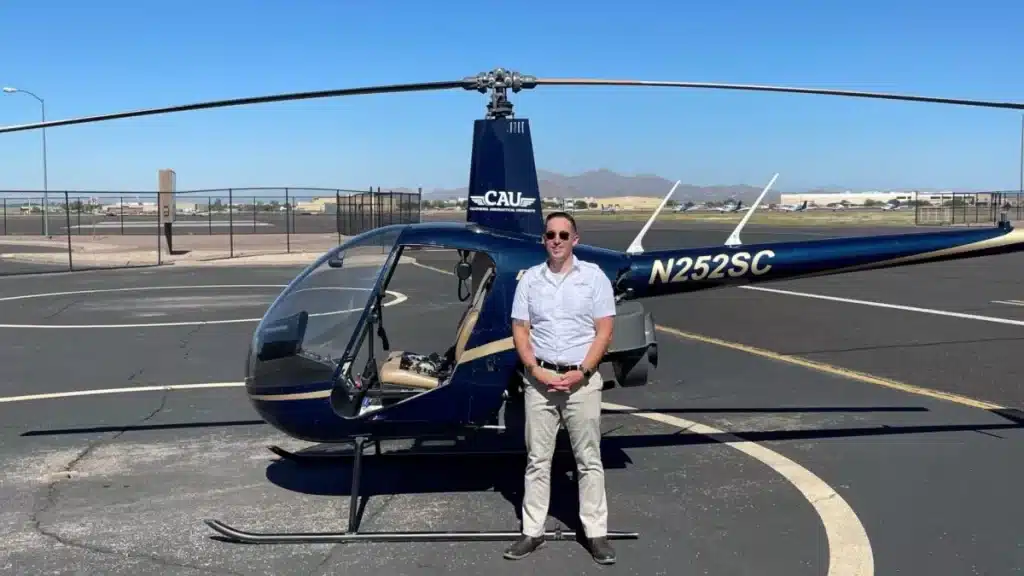People who love aviation frequently encounter terms such as “license” and “certification” when talking about helicopter pilots. The meanings of these terms may overlap at times. They represent stages in a pilot’s progression. It is vital for individuals aiming to become pilots to grasp these differences to understand their career paths.
Explaining What a Pilot License Is
Obtaining a helicopter pilot license involves receiving approval to fly helicopters and signifies compliance with rules established by aviation bodies. It marks a milestone in a pilot’s journey, enabling them to operate helicopters under designated circumstances specified by the license category. Different helicopter licenses are available, with rights and restrictions attached to them. A private pilot license (PPL for short) allows novices to fly for commercial purposes. People aspiring to a career as a pilot usually obtain a commercial pilot license (CPL), which permits employment as a pilot.
Attaining a Pilot Certificate
Becoming a helicopter pilot is a journey that includes steps for aspiring pilots to follow through. This is attained with rigorous training at an authorized flight school that blends classroom learning with practical flying experience covering various subjects, such as aircraft systems and navigation techniques alongside aerodynamics principles, in detail. Once the aspiring pilots have finished their required training hours successfully, they are required to take a written exam as part of the process.
Gaining Knowledge About Certification
Certification differs in that it pertains to credentials or approvals that improve a pilot’s expertise level. These certifications supplement a license and enable pilots to handle conditions or carry out particular duties, typically emphasizing advanced methods or specialized gear. Credentials such as ratings are widely recognized in the aviation community for their importance and relevance to pilot certification processes.
The Journey to Obtaining Certifications
Obtaining certification usually requires training beyond the pilot license that was initially obtained. Pilots who aim for certification are required to complete training customized to the endorsement they are pursuing. This training focuses on enhancing skills to ensure pilots can safely perform maneuvers. Upon completion of the training program, pilots are required to showcase their skills in a hands-on test to confirm their proficiency in executing tasks to the certification requirements with precision and accuracy.
Significant Contrasts
In a pilot’s career journey, licenses and certifications are vital elements, with certain characteristics separating them. A pilot license acts as a necessity for flying helicopters and unlocks prospects in the aviation field. Conversely, certifications enhance this groundwork by enabling pilots to focus on areas and broaden their skills. Pilots usually need to undergo a training period for licenses. They are meant to validate the pilot’s skills and ensure they can safely fly aircraft. Certifications, on the other hand, focus on skills to help pilots excel in specific aviation domains.
Exploring the Role of Technology in Aviation Systems
In the aviation industry, licenses and certifications are highly valued by employers seeking pilots. Certifications highlight meeting job requirements. Moreover, gaining certifications can boost a pilot’s career advancement by providing them with knowledge that could open doors to job markets or positions that demand advanced abilities.
Deciding on the Course of Action
Budding aviators need to weigh their aspirations when deciding which licenses and certifications to pursue in aviation. Acquiring a pilot license is crucial for those aiming to introduce themselves to flying. It sets the foundation for legally navigating helicopters in the skies. For those with career goals in mind, it can be advantageous to seek certifications at the start of their career path. These credentials offer an advantage in job markets by demonstrating a pilot’s commitment and expertise in fields.
End Note
It’s important for those dreaming of becoming helicopter pilots to grasp the distinction between a pilot license and certification. Pilot licenses provide the qualifications required for flying aircraft; certifications help enhance a pilot’s skills and knowledge. Being aware of these differences allows individuals to make choices and sets them on the path toward a career in aviation.
